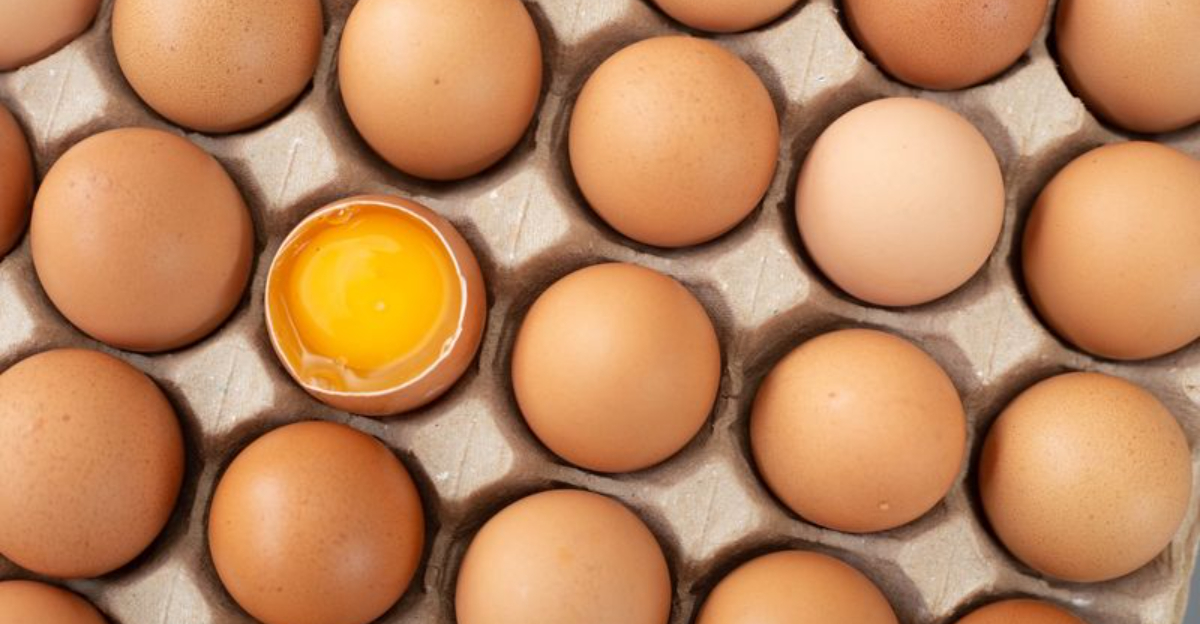15 Crazy Myths About Eggs That Science Has Completely Debunked

Eggs have been a breakfast staple in my kitchen for as long as I can remember. Just last week, I was whipping up a fluffy omelet when my neighbor dropped by with some bizarre egg ‘facts’ that made me raise an eyebrow.
To my surprise, there’s a whole carton-full of misinformation about these oval wonders! From debates about cholesterol to misconceptions about eggshell color, people often get it wrong.
Eggs are packed with protein, but there’s a lot of confusion surrounding their health benefits and cooking myths. Let’s crack open the truth and clear up the misconceptions about these breakfast powerhouses.
1. Brown Eggs Are More Nutritious Than White Ones
Shell color comes solely from the breed of chicken, not nutritional content! My aunt used to pay premium prices for brown eggs, convinced they were healthier until I showed her the research.
Brown-egg layers like Rhode Island Reds and white-egg producers like Leghorns create identical insides regardless of their fashionable outer packaging. The nutritional profile remains exactly the same—same protein, same vitamins, same everything.
The only real difference? Brown-egg-laying hens tend to be larger birds that eat more feed, which explains the higher price tag. Your wallet might feel the difference, but your body won’t!
2. Eggs Raise Your Cholesterol Dangerously
Remember the egg-scare of the 1980s? I grew up watching my grandfather meticulously count his weekly egg consumption, terrified of exceeding his doctor-prescribed limit.
Newer research has scrambled this old thinking! While eggs do contain cholesterol, they don’t significantly impact blood cholesterol levels in most people. Our bodies actually adjust internal cholesterol production when we consume it from food sources.
For healthy individuals, enjoying an egg daily poses no increased risk for heart problems. The protein, vitamins, and minerals packed into these oval wonders actually contribute to overall health rather than harming it!
3. Raw Eggs Build Muscle Better
Rocky Balboa may have gulped raw eggs before his workouts, but science gives this practice a technical knockout! I once considered trying this protein-packed ritual myself until discovering the truth.
Your body actually absorbs nearly twice as much protein from cooked eggs compared to raw ones. Cooking breaks down protein structures, making them more accessible for your muscles to use.
Plus, raw eggs carry salmonella risk—something no fitness routine needs! The heat from cooking eliminates harmful bacteria while maximizing nutritional benefits. So keep your eggs on the skillet and out of the glass for truly egg-cellent muscle-building results!
4. Fertile Eggs Have Superior Nutrition
Last summer at the farmers’ market, a vendor tried charging me extra for ‘fertile’ eggs, claiming they contained life-force energy and nutritional superpowers. My wallet stayed firmly in my pocket!
Laboratory analyses consistently show zero nutritional difference between fertile and unfertile eggs. The fertilization process affects the potential for embryo development, not the egg’s vitamin or mineral content.
The only thing ‘special’ about fertile eggs might be the tiny germinal disc visible on the yolk—a cellular collection that would develop into a chick under proper incubation conditions. Save your money and skip this egregiously overpriced myth!
5. Egg Whites Contain All The Protein
Confession time: I spent years tossing perfectly good yolks down the drain, thinking I was being health-conscious by sticking to whites only. What a waste of golden goodness!
While egg whites do contain about 60% of an egg’s protein, the remaining 40% lives in that sunshine-colored yolk. Plus, the yolk exclusively houses fat-soluble vitamins like A, D, E, and K, along with brain-boosting choline.
The whole-egg package delivers complete nutrition that the white alone simply can’t match. My morning scramble now proudly features the entire egg—both parts working in perfect harmony for maximum nutritional benefit!
6. You Can Tell If Eggs Are Fresh By Floating Them
This one’s actually true—but not for the reason most people think! I learned this trick from my grandmother, who could determine an egg’s age with just a bowl of water.
Eggs naturally contain an air cell that grows larger as the egg ages and moisture evaporates through the porous shell. Fresh eggs sink and lie horizontally, while older eggs stand upright or float due to this expanding air pocket.
However, floating doesn’t automatically mean an egg is spoiled—just older! The definitive freshness test comes after cracking: fresh eggs have plump, centered yolks and thick whites that don’t spread much. Age matters for poaching and frying, but older eggs actually peel easier when hard-boiled!
7. Eggs With Blood Spots Are Unsafe
Finding a tiny red spot in my breakfast egg used to send me straight to the garbage disposal. What a needless waste that was! These harmless specks, called meat spots, occur when a small blood vessel ruptures during egg formation.
Commercial egg producers use candling (shining light through eggs) to remove most spotted eggs before packaging, which is why they’re rarely seen in store-bought cartons. Farm-fresh eggs display them more frequently since they bypass this process.
These spots pose absolutely no health risk and don’t indicate fertilization. They’re simply a natural occurrence you can eat without concern or remove with the tip of a knife if they bother you aesthetically.
8. Cage-Free Means Cruelty-Free
Marketing magic had me fooled! I’d smugly select cage-free eggs, picturing happy hens frolicking in green pastures. Reality check: ‘cage-free’ simply means birds aren’t confined to battery cages—not that they’re living their best chicken lives.
Many cage-free operations still pack thousands of hens into crowded indoor facilities with limited outdoor access. The birds may never see sunshine or feel grass beneath their feet!
For truly humanely raised eggs, look for certifications like Animal Welfare Approved or Certified Humane with pasture-raised designation. Better yet, find a local farmer whose practices you can verify firsthand—that’s how I finally found eggs I could feel good about!
9. Eating Eggs During Pregnancy Is Dangerous
When my sister was expecting, her mother-in-law practically slapped a perfectly cooked egg off her plate! This well-intentioned but misguided concern stems from outdated fears about salmonella risk.
Fully cooked eggs are not only safe during pregnancy but highly beneficial! They provide choline—critical for fetal brain development—plus high-quality protein and essential nutrients like folate that support healthy growth.
The only eggs expectant mothers should avoid are raw or undercooked ones (think runny yolks or homemade mayo). As long as those whites and yolks are firmly set, eggs make an excellent addition to a pregnancy diet. My sister eventually won that breakfast battle with science on her side!
10. Egg Yolk Color Indicates Nutritional Value
Those vibrant orange yolks from my farmers’ market eggs had me convinced they were nutritionally superior to their paler supermarket counterparts. Turns out, I was paying premium prices for essentially food coloring!
Yolk color comes primarily from pigments in chicken feed—specifically xanthophylls like lutein. Free-range hens eating natural diets rich in plants and insects naturally produce more colorful yolks than those on standard commercial feed.
While deeper color might indicate higher levels of certain carotenoids, the difference in overall nutritional value is minimal. Some producers even add marigold extract to feed specifically to achieve that Instagram-worthy orange hue! Don’t judge an egg by its color alone.
11. Eggs Should Always Be Refrigerated
My European friends laughed at my horror when I saw eggs sitting unrefrigerated at their local markets. How could something so perishable just… sit there?
The difference lies in processing! American eggs are washed before sale, removing a natural protective coating called the bloom. Without this barrier, eggs need refrigeration to prevent bacteria from penetrating the porous shell.
European eggs remain unwashed, bloom intact, allowing safe storage at room temperature. Once refrigerated, however, eggs should stay cold—temperature fluctuations cause condensation that can draw bacteria through the shell. So depending on how your eggs were processed, that countertop egg basket might be perfectly fine or a foodborne illness waiting to happen!
12. Eggs Expire On Their Carton Date
Last month I nearly tossed a dozen eggs that were three days past their carton date until my frugal roommate intervened with a sniff test. Thank goodness for his wisdom!
The date printed on egg cartons is actually a ‘sell-by’ date for retailers, not an expiration date for consumers. Properly refrigerated eggs typically remain safe and high-quality for 3-5 weeks after purchase, regardless of that printed date.
The ultimate freshness test? Crack it open! Fresh eggs have centered, domed yolks and whites that hold together well. If it looks and smells normal (no strange colors or odors), it’s perfectly fine to enjoy—even weeks after that arbitrary carton date.
13. Double-Yolked Eggs Are Genetically Modified
Finding two yolks in one egg shell feels like winning the breakfast lottery! Last Sunday, I cracked open three double-yolkers in a row and jokingly told my kids they were ‘GMO mutant eggs.’ Bad parenting moment—this common myth needed immediate correction!
Double-yolked eggs occur naturally when a chicken releases two yolks into the same shell. Young hens whose reproductive systems aren’t fully regulated are particularly prone to this harmless irregularity.
Far from being laboratory creations, these twins are simply nature’s overachievers! Some specialty farms even selectively breed hens that consistently produce doubles. Next time you find this two-for-one special, consider yourself lucky rather than laboratory-duped!
14. Eating Eggs Makes You Gain Weight
My weight-conscious friend used to order sad, egg-white omelets, convinced whole eggs would expand her waistline. I finally convinced her to go whole-egg after learning about their actual weight effects.
Research shows eggs may actually support weight management! Their high protein content increases satiety (feeling full), potentially reducing overall calorie intake throughout the day. One study found overweight participants who ate eggs for breakfast consumed fewer calories for the next 36 hours compared to those who had bagels.
The combination of protein and healthy fats creates lasting energy without blood sugar spikes that trigger hunger. At around 70 calories per egg, these nutrient-dense packages deliver maximum nutrition with minimal caloric impact!
15. All Eggs Taste The Same
My taste buds were revolutionized the first time I sampled eggs from my cousin’s backyard chickens! The rich, almost buttery flavor made store-bought eggs taste like pale imitations.
Egg flavor varies dramatically based on the hen’s diet, breed, and living conditions. Pasture-raised chickens foraging on diverse plants, insects, and worms produce eggs with more complex, robust flavors than those from birds eating standardized commercial feed.
Freshness also plays a crucial role—eggs begin losing flavor compounds immediately after laying. The three-week-old supermarket egg simply can’t compete with one collected that morning! For a true taste test, find a local source where the hens enjoy varied diets and natural living conditions.
